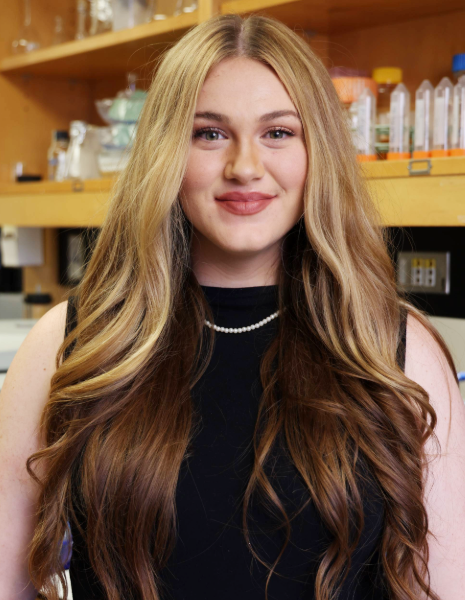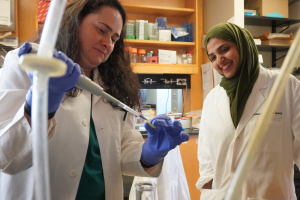
Three Training Tracks
The DART Program offers three training tracks:
-
Track I - D.M.D./Ph.D. - Dual Degree Program
An innovative clinician scientist training program, the DART DMD/PhD track is designed to prepare students for an exciting career in dental academics by providing a broadened interdisciplinary research experience for exceptionally motivated trainees in a research-intensive academic environment.
Financial Support
Students enrolled in the DMD/PhD training program may be eligible for year 1 funding through UAB’s Graduate Biomedical Sciences (GBS) if they fall within one of the GBS themes.
Students pursuing basic or clinical research are eligible for funding through the School of Dentistry’s Dental Academic Research Training (DART) Program for years 2-4 upon admission to a UAB faculty member’s laboratory for mentor-based research training. DART provides a broadened interdisciplinary research experience for exceptionally motivated trainees in a research-intensive academic environment. Funding for DART is provided by the National Institute of Dental and Craniofacial Research (NIDCR) T90/R90 Institutional Training Grant. Trainees of the NIH funded T90/R90 grant will receive a stipend/salary and health insurance, partial support to cover tuition, travel and research-related expenses for up to 3 years.
Students are then are expected to secure an NIH Individual Predoctoral Research Fellowship (F30) to support their training in years 5, 6 and 7. DART trainees are expected to prepare an Individual Research Fellowship proposal for submission to NIH during their appointment. Proposal must be pre-reviewed by the DART Leadership Council or a Review Panel selected by the Leadership Council prior to submission.
-
Track II - Pre-doctoral
The DART Pre-doctoral Training Program is designed to prepare trainees for a career in academic research in either basic science or clinical dental research.
Pre-doctoral training appointments are for a maximum of three years and are funded through the DART (NIDCR T90/R90) training grant. After which trainees are eligible to apply for NIH F31 funding to cover additional years of training. DART pre-doctoral fellows are expected to submit a Kirschstein-NRSA individual fellowship application to NIH during their appointment. The proposal must be pre-reviewed by the DART Leadership Council or a review panel selected by the council prior to submission.
Application
Applications are accepted from students across campus with mentors who fit within the School of Dentistry research themes. The Pre-doctoral Track of DART has an expected start date of July 1. Applicants must be a U.S. Citizen or permanent resident (Green Card holder).
INSTRUCTIONS: Please send application packet electronically to Amber Jackson at
This email address is being protected from spambots. You need JavaScript enabled to view it. . -
Track III- Post-doctoral Training
The DART Post-doctoral Training Program is designed to prepare its fellows for a career in academic research in either basic science or clinical dental research.
Following the initial 3 years of funding through the DART (NIDCR T90/R90) training grant, DART post-doctoral fellows are expected to prepare and submit an F32 individual fellowship or K99/R00 Pathway to Independence Award application to NIH during their appointment. Proposal must be pre-reviewed by the DART Leadership Council or a review panel selected by the council prior to submission.
Postdoctoral fellows will be eligible for support from this program upon admission to one of the faculty member’s laboratories with federal funding for mentor-based research training and to develop an independent project.
UAB School of Dentistry renews $3.2 million from NIH to train future dentistry academicians
Program Requirements
- Participate in the weekly Journal Club and bi-monthly Research Seminar Series
- Attend a Scientific Writing Series
- Present research annually at the School of Dentistry’s Scholars Symposium
- Attend institutional grant writing program
- Submit research progress report annually
- Submit an NIH individual fellowship or Pathway to Independence Award application
Initial Financial Support
Initial funding for DART trainees is provided by a training grant through NIDCR T90/R90 and covers the following:
- NIH stipend based on years of post-degree experience. Renewable for up to 3 years, with satisfactory annual review
- Up to 60% of tuition and fees
- Health insurance
- Travel support to attend conferences
Mentors
DART Trainees

Tyra Avery
Mentor: Amjad Javed, MSc, PhD
Hometown: Nashville, TN
Research Topic: The role of RING-box protein 2 during endochondral ossification

Faimeena Farheen, BDS
Mentor: Amjad Javed, MSc, PhD
Hometown: Hyderabad, India
Research Topic: Chondrocytes specific role of Runx2 during postnatal development of the temporomandibular joint (TMJ).

Logan Stone
Mentor: Hope Amm, Ph.D.
Hometown: Mt. Washington, KY
Research Topic: Imaging Modalities in Bone Involving Tumors of the Mandible

Hani Ali, PhD
Mentor: Amjad Javed, MSc, PhD
Hometown: Aden, Yemen
Research Topic: The role of exon 8 of Runx2 gene in tooth development

Yali Huang, PhD
Mentor: Jianbo Wang, PhD
Hometown: Fujan, China
Research Topic: Non-canonical Wnt signaling in craniofacial development and disease

Chloe La Prairie
Mentor: Ping Zhang, DDS, PhD
Hometown: Santa Clarita, CA
Research Topic: Association between periodontal disease and colorectal cancer progression and metastasis

Avery Lieber
Mentor: Michael Gray, PhD
Hometown: Maplewood, NJ
Research Topic: Hypothiocyanite resistance of oral streptococci

Muhammad “Shahid” Riaz, PhD
Mentor: Ping Zhang, DDS, PhD
Hometown: Chiniot, Pakistan
Research Topic: Importance of Periodontitis in the Innate Immune Regulation of Alzheimer’s Disease

Laiba Asif, BDS
Mentor: Amjad Javed, MSc, PhD
Hometown: Okara, Pakistan
Research Topic: Genetics of Amelogenesis imperfecta

Kristina Valladares
Mentor: Ping Zhang, DDS, PhD
Hometown: Lakeland, FL
Research Topic: Lipid -laden macrophages in the pathogenesis of periodontitis
